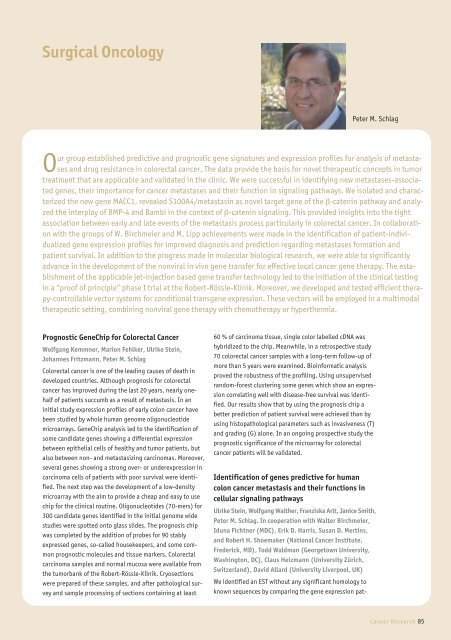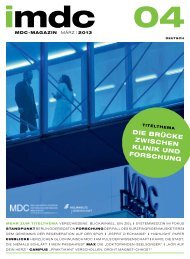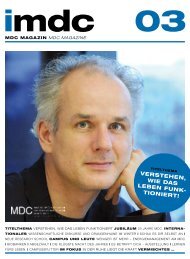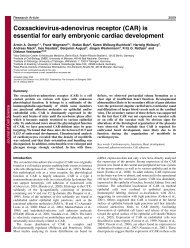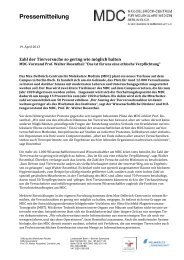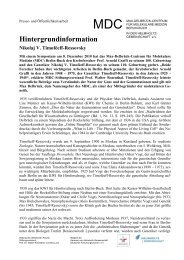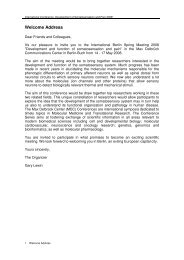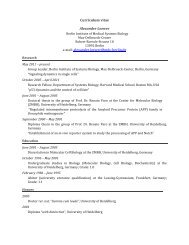of the Max - MDC
of the Max - MDC
of the Max - MDC
Create successful ePaper yourself
Turn your PDF publications into a flip-book with our unique Google optimized e-Paper software.
Surgical Oncology<br />
Peter M. Schlag<br />
Our group established predictive and prognostic gene signatures and expression pr<strong>of</strong>iles for analysis <strong>of</strong> metastases<br />
and drug resistance in colorectal cancer. The data provide <strong>the</strong> basis for novel <strong>the</strong>rapeutic concepts in tumor<br />
treatment that are applicable and validated in <strong>the</strong> clinic. We were successful in identifying new metastases-associated<br />
genes, <strong>the</strong>ir importance for cancer metastases and <strong>the</strong>ir function in signaling pathways. We isolated and characterized<br />
<strong>the</strong> new gene MACC1, revealed S100A4/metastasin as novel target gene <strong>of</strong> <strong>the</strong> β-catenin pathway and analyzed<br />
<strong>the</strong> interplay <strong>of</strong> BMP-4 and Bambi in <strong>the</strong> context <strong>of</strong> β-catenin signaling. This provided insights into <strong>the</strong> tight<br />
association between early and late events <strong>of</strong> <strong>the</strong> metastasis process particularly in colorectal cancer. In collaboration<br />
with <strong>the</strong> groups <strong>of</strong> W. Birchmeier and M. Lipp achievements were made in <strong>the</strong> identification <strong>of</strong> patient-individualized<br />
gene expression pr<strong>of</strong>iles for improved diagnosis and prediction regarding metastases formation and<br />
patient survival. In addition to <strong>the</strong> progress made in molecular biological research, we were able to significantly<br />
advance in <strong>the</strong> development <strong>of</strong> <strong>the</strong> nonviral in vivo gene transfer for effective local cancer gene <strong>the</strong>rapy. The establishment<br />
<strong>of</strong> <strong>the</strong> applicable jet-injection based gene transfer technology led to <strong>the</strong> initiation <strong>of</strong> <strong>the</strong> clinical testing<br />
in a “pro<strong>of</strong> <strong>of</strong> principle“ phase I trial at <strong>the</strong> Robert-Rössle-Klinik. Moreover, we developed and tested efficient <strong>the</strong>rapy-controllable<br />
vector systems for conditional transgene expression. These vectors will be employed in a multimodal<br />
<strong>the</strong>rapeutic setting, combining nonviral gene <strong>the</strong>rapy with chemo<strong>the</strong>rapy or hyper<strong>the</strong>rmia.<br />
Prognostic GeneChip for Colorectal Cancer<br />
Wolfgang Kemmner, Marion Fehlker, Ulrike Stein,<br />
Johannes Fritzmann, Peter M. Schlag<br />
Colorectal cancer is one <strong>of</strong> <strong>the</strong> leading causes <strong>of</strong> death in<br />
developed countries. Although prognosis for colorectal<br />
cancer has improved during <strong>the</strong> last 20 years, nearly onehalf<br />
<strong>of</strong> patients succumb as a result <strong>of</strong> metastasis. In an<br />
initial study expression pr<strong>of</strong>iles <strong>of</strong> early colon cancer have<br />
been studied by whole human genome oligonucleotide<br />
microarrays. GeneChip analysis led to <strong>the</strong> identification <strong>of</strong><br />
some candidate genes showing a differential expression<br />
between epi<strong>the</strong>lial cells <strong>of</strong> healthy and tumor patients, but<br />
also between non- and metastasizing carcinomas. Moreover,<br />
several genes showing a strong over- or underexpression in<br />
carcinoma cells <strong>of</strong> patients with poor survival were identified.<br />
The next step was <strong>the</strong> development <strong>of</strong> a low-density<br />
microarray with <strong>the</strong> aim to provide a cheap and easy to use<br />
chip for <strong>the</strong> clinical routine. Oligonucleotides (70-mers) for<br />
300 candidate genes identified in <strong>the</strong> initial genome wide<br />
studies were spotted onto glass slides. The prognosis chip<br />
was completed by <strong>the</strong> addition <strong>of</strong> probes for 90 stably<br />
expressed genes, so-called housekeepers, and some common<br />
prognostic molecules and tissue markers. Colorectal<br />
carcinoma samples and normal mucosa were available from<br />
<strong>the</strong> tumorbank <strong>of</strong> <strong>the</strong> Robert-Rössle-Klinik. Cryosections<br />
were prepared <strong>of</strong> <strong>the</strong>se samples, and after pathological survey<br />
and sample processing <strong>of</strong> sections containing at least<br />
60 % <strong>of</strong> carcinoma tissue, single color labelled cDNA was<br />
hybridized to <strong>the</strong> chip. Meanwhile, in a retrospective study<br />
70 colorectal cancer samples with a long-term follow-up <strong>of</strong><br />
more than 5 years were examined. Bioinformatic analysis<br />
proved <strong>the</strong> robustness <strong>of</strong> <strong>the</strong> pr<strong>of</strong>iling. Using unsupervised<br />
random-forest clustering some genes which show an expression<br />
correlating well with disease-free survival was identified.<br />
Our results show that by using <strong>the</strong> prognosis chip a<br />
better prediction <strong>of</strong> patient survival were achieved than by<br />
using histopathological parameters such as invasiveness (T)<br />
and grading (G) alone. In an ongoing prospective study <strong>the</strong><br />
prognostic significance <strong>of</strong> <strong>the</strong> microarray for colorectal<br />
cancer patients will be validated.<br />
Identification <strong>of</strong> genes predictive for human<br />
colon cancer metastasis and <strong>the</strong>ir functions in<br />
cellular signaling pathways<br />
Ulrike Stein, Wolfgang Wal<strong>the</strong>r, Franziska Arlt, Janice Smith,<br />
Peter M. Schlag. In cooperation with Walter Birchmeier,<br />
Iduna Fichtner (<strong>MDC</strong>), Erik D. Harris, Susan D. Mertins,<br />
and Robert H. Shoemaker (National Cancer Institute,<br />
Frederick, MD), Todd Waldman (Georgetown University,<br />
Washington, DC), Claus Heizmann (University Zürich,<br />
Switzerland), David Allard (University Liverpool, UK)<br />
We identified an EST without any significant homology to<br />
known sequences by comparing <strong>the</strong> gene expression pat-<br />
Cancer Research 85


